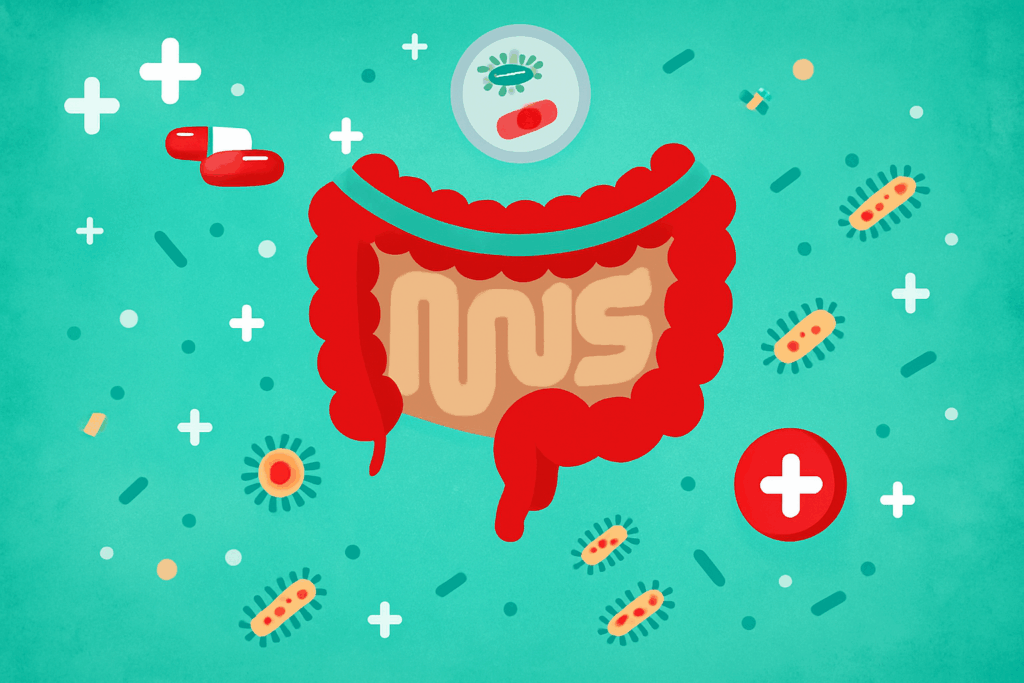Probiotics for gut health have gained attention for their potential to support digestion, balance intestinal bacteria, and improve overall wellness. These live microorganisms, often called “good” bacteria, help maintain a healthy digestive tract. As research grows, more people are turning to probiotic-rich foods and supplements to address common digestive issues and support immune health.
Gut health plays a major role in how the body absorbs nutrients, fights off infections, and even influences mood. An unbalanced gut microbiome can lead to problems like bloating, constipation, and weakened immunity. Probiotics offer a simple and natural way to restore balance and improve gut function.
“An estimated 60 to 70 million Americans are affected by digestive diseases, according to the National Institute of Diabetes and Digestive and Kidney Diseases.”
Source: Digestive Diseases Statistics
This article explores the top benefits of probiotics for gut health, how they work, and how to choose the right type for your needs.
What Are Probiotics?
Probiotics are live microorganisms that offer health benefits when consumed in adequate amounts. Most often, they are strains of beneficial bacteria that naturally live in your digestive system. These bacteria help keep harmful microbes in check and support several important bodily functions, especially those related to digestion and immune defense.
You can find probiotics in many fermented foods, such as yogurt, kefir, sauerkraut, kimchi, and miso. They’re also available in dietary supplements, which can provide a higher and more targeted dose. People often turn to these supplements when they want to improve their gut health or restore balance after illness or antibiotic use.
It’s important to distinguish between probiotics and prebiotics. While probiotics are beneficial bacteria, prebiotics are non-digestible fibers that feed those bacteria. Together, they help maintain a healthy and balanced gut microbiome. Understanding how probiotics for gut health function starts with knowing what they are and where to find them.

How Probiotics Affect Gut Health
Probiotics for gut health work by supporting a balanced microbiome—the collection of bacteria, viruses, and fungi that live in the digestive tract. When the gut contains too many harmful bacteria or not enough beneficial ones, it can lead to digestive problems, weakened immunity, and even chronic inflammation.
Probiotics help by introducing more beneficial bacteria into the gut. These good bacteria compete with harmful microbes, reducing their ability to grow and cause problems. In doing so, probiotics support smoother digestion and help maintain the integrity of the intestinal lining, which serves as a barrier against toxins and pathogens.
They also influence the gut’s environment by producing substances like short-chain fatty acids, which fuel the cells lining the colon and support regular bowel movements. In short, probiotics for gut health work by creating balance, promoting a healthy environment in the digestive tract, and supporting other systems connected to gut function.
Top Benefits of Probiotics for Gut Health
Probiotics offer several well-researched benefits that support digestive wellness and overall health. Below are the most important advantages of using probiotics for gut health:
Improved Digestive Regularity
One of the most common reasons people use probiotics is to support regular bowel movements. Certain probiotic strains help move food through the digestive system more efficiently, which can reduce constipation and promote consistent stool patterns. They also support the absorption of nutrients by maintaining a healthy intestinal lining.
Reduced Symptoms of IBS and IBD
Irritable Bowel Syndrome (IBS) and Inflammatory Bowel Disease (IBD) can both cause bloating, cramps, and irregular digestion. Research shows that probiotics can ease these symptoms by calming inflammation and balancing the gut microbiome. Regular use of probiotics for gut health may lead to fewer flare-ups and a more stable digestive system.
“A 2020 meta-analysis found that probiotics reduced overall IBS symptoms by 50% in many patients when used consistently for at least eight weeks.“
Source: Probiotics for the treatment of irritable bowel syndrome
Enhanced Immune Function
Roughly 70% of the body’s immune system is located in the gut. A healthy microbiome strengthens immune responses and helps the body detect and destroy harmful pathogens. Probiotics stimulate the production of natural antibodies and support immune cells like T lymphocytes and natural killer cells.
“Roughly 70% of the body’s immune cells are located in the gut, showing the strong connection between gut health and immune function.“
Source: Gut microbiota and immunity
Prevention and Treatment of Diarrhea
Probiotics are effective in managing several types of diarrhea, including antibiotic-associated diarrhea and infectious diarrhea. They help restore the gut’s bacterial balance, especially after the disruption caused by antibiotics or stomach viruses.
“A review of 63 studies published in The Cochrane Library showed that probiotics reduced the risk of antibiotic-associated diarrhea by 42%.”
Source: Probiotics for preventing antibiotic-associated diarrhea
Restoration of Gut Flora After Antibiotics
Antibiotics kill both harmful and beneficial bacteria. This disruption can lead to digestive issues and a weakened immune response. Probiotics for gut health help repopulate the intestine with beneficial bacteria, speeding up recovery and reducing the risk of future infections.
“It can take up to six months for gut flora to fully recover after a course of antibiotics. Probiotic use may cut this time significantly.”
Support for Mental Health (Gut-Brain Axis)
Emerging studies suggest a strong connection between the gut and the brain. Probiotics may influence mood, stress levels, and mental clarity by promoting a balanced gut environment. While research is ongoing, some strains appear to reduce symptoms of anxiety and depression.
Reduced Inflammation in the Gut
Chronic inflammation in the gut can contribute to various health issues, including food sensitivities, fatigue, and autoimmune conditions. Probiotics help reduce this inflammation by reinforcing the gut lining and supporting the production of anti-inflammatory compounds.

Choosing the Right Probiotic
Not all probiotics are the same. Each strain has different effects on the body, so choosing the right probiotic depends on your specific health needs. When looking for probiotics for gut health, pay attention to the strain type, colony-forming units (CFUs), and delivery method.
Certain strains, such as Lactobacillus acidophilus, Bifidobacterium lactis, and Saccharomyces boulardii, have been studied for their digestive and immune benefits. Products that list these specific strains on the label are more likely to deliver targeted results.
CFU count refers to the number of live organisms in each serving. While a higher count isn’t always better, most effective probiotic supplements contain at least 1 billion CFUs per dose. For gut health, consistency is key—taking the supplement daily helps maintain bacterial balance.
Storage matters, too. Some probiotics need refrigeration, while others are shelf-stable. Be sure to follow the product’s instructions to preserve potency. Choosing a quality probiotic tailored to your health concerns will make a noticeable difference in gut function and overall well-being.
Who Should Consider Probiotic Supplements?
Probiotic supplements can be helpful for a wide range of people, especially those dealing with digestive issues or recovering from illness. While many people get probiotics from fermented foods, supplements offer a more concentrated and reliable way to support gut health.
People with irregular digestion, bloating, or frequent constipation may benefit from daily probiotics for gut health. These supplements can help restore balance in the microbiome and improve how the digestive system functions.
Those who have recently taken antibiotics are also good candidates. Antibiotics often wipe out both harmful and helpful bacteria, leaving the gut vulnerable. Probiotic supplements can help replenish beneficial bacteria and reduce the risk of antibiotic-associated diarrhea.
In addition, individuals with weakened immune systems, poor diets, or high stress levels may consider probiotics to support both gut and immune health. Travelers exposed to new foods and water sources can also use probiotics to maintain stability in their digestive systems.
If you have a medical condition or take medication, it’s best to speak with a healthcare provider before starting a probiotic regimen.

Potential Side Effects and Considerations
While probiotics for gut health are generally safe for most people, they can cause mild side effects in some cases. These effects are usually temporary and often occur when starting a new supplement. Common issues include gas, bloating, or mild stomach discomfort as the gut adjusts to the influx of new bacteria.
For most people, these symptoms go away within a few days. Starting with a lower dose and gradually increasing it can make the transition easier. Drinking plenty of water and taking probiotics with food may also help minimize discomfort.
Certain individuals should use caution or consult a healthcare provider before taking probiotics. This includes people with compromised immune systems, those undergoing cancer treatment, or individuals recovering from major surgery. In rare cases, probiotics may lead to infections in people with severely weakened immunity.
It’s also important to choose high-quality supplements from reputable brands. Look for products that list specific strains, include expiration dates, and offer third-party testing. Not all supplements are created equally, and using a low-quality probiotic may not deliver the benefits you’re looking for.
Conclusion
Probiotics for gut health play an important role in supporting digestion, restoring balance in the microbiome, and promoting overall wellness. From easing symptoms of IBS to reducing inflammation and improving regularity, the benefits are well-documented and accessible to most people through food or supplements.
Choosing the right probiotic involves understanding your specific needs and selecting strains and products that align with them. While some may benefit from fermented foods, others may require targeted support through daily supplementation. For those recovering from antibiotics, managing chronic digestive issues, or looking to support their immune system, probiotics can offer a practical solution.
As with any supplement, consistency matters. Regular use, combined with a balanced diet and healthy lifestyle, can help maintain a strong and stable gut environment. If you’re considering probiotics for gut health, speak with a healthcare provider to ensure the approach is right for you.
Frequently Asked Questions (FAQs) – Probiotics for Gut Health
1. How long does it take for probiotics to improve gut health?
Most people notice improvements within one to two weeks of consistent use. However, results can vary depending on the specific strain, dosage, and individual digestive health.
2. Can I get enough probiotics from food alone?
Yes, fermented foods like yogurt, kefir, kimchi, sauerkraut, and miso are good sources. But for consistent and higher doses, supplements may be more effective—especially when addressing specific digestive issues.
3. Are probiotics safe for children?
Probiotics are generally safe for children, but it’s best to consult a pediatrician before giving them to a child, especially if the child has a medical condition or is taking medication.
4. Do probiotics need to be refrigerated?
Some do, while others are shelf-stable. Always follow the storage instructions on the label to ensure the bacteria remain alive and effective.
5. Can I take probiotics with other supplements or medications?
In most cases, yes. However, you should speak with a healthcare provider if you’re taking prescription medications or managing a health condition.
6. Do probiotics cause side effects?
Mild symptoms like gas or bloating may occur in the first few days. These usually go away as your body adjusts. If symptoms persist, consult a healthcare professional.
7. Are all probiotics the same?
No. Different strains offer different benefits. For example, Lactobacillus strains may help with digestion, while Bifidobacterium strains often support immune function.
References
- Mayo Clinic. (2023). Probiotics: What you need to know. Mayo Foundation for Medical Education and Research.
- National Center for Complementary and Integrative Health. (2023). Probiotics: What you need to know. U.S. Department of Health & Human Services.
- MedlinePlus. (2023). Probiotics. National Library of Medicine.
- Harvard Health Publishing. (2022). Should you take probiotics?. Harvard Medical School.
- Cleveland Clinic. (2023). What are probiotics?. Cleveland Clinic Foundation.
- Abdelhamid AG, El-Masry SS, El-Dougdoug NK. Probiotic Lactobacillus and Bifidobacterium strains possess safety characteristics, antiviral activities and host adherence factors revealed by genome mining. EPMA J. 2019 Sep 5;10(4):337-350. Accessed 10/29/2023.
- U.S. National Institutes of Health (U.S.). Probiotics: What You Need To Know. Last updated 8/2019. Accessed 10/29/2023.
- Bafeta A, Koh M, Riveros C, et al. Harms reporting in randomized controlled trials of interventions aimed at modifying microbiota: a systematic review. Annals of Internal Medicine. 2018;169(4):240-247.
- Blaabjerg S, Artzi DM, Aabenhus R. Probiotics for the prevention of antibiotic-associated diarrhea in outpatients—a systematic review and meta-analysis. Antibiotics. 2017;6(4).pii:E21.
- Butel M-J. Probiotics, gut microbiota and health. Médecine et Maladies Infectieuses. 2014;44(1):1-8.
- Cohen PA. Probiotic safety—no guarantees. JAMA Internal Medicine. 2018;178(12):1577-1578.
- Degnan FH. The US Food and Drug Administration and probiotics: regulatory categorization. Clinical Infectious Diseases. 2008;46(Suppl 2):S133–S136.
- Didari T, Solki S, Mozaffari S, et al. A systematic review of the safety of probiotics. Expert Opinion on Drug Safety. 2014;13(2):227–239.
- Dryl R, Szajewska H. Probiotics for management of infantile colic: a systematic review of randomized controlled trials. Archives of Medical Science. 2018;14(5):1137-1143.
- Fijan S. Microorganisms with claimed probiotic properties: an overview of recent literature. International Journal of Environmental Research and Public Health. 2014;11(5):4745-4767.






